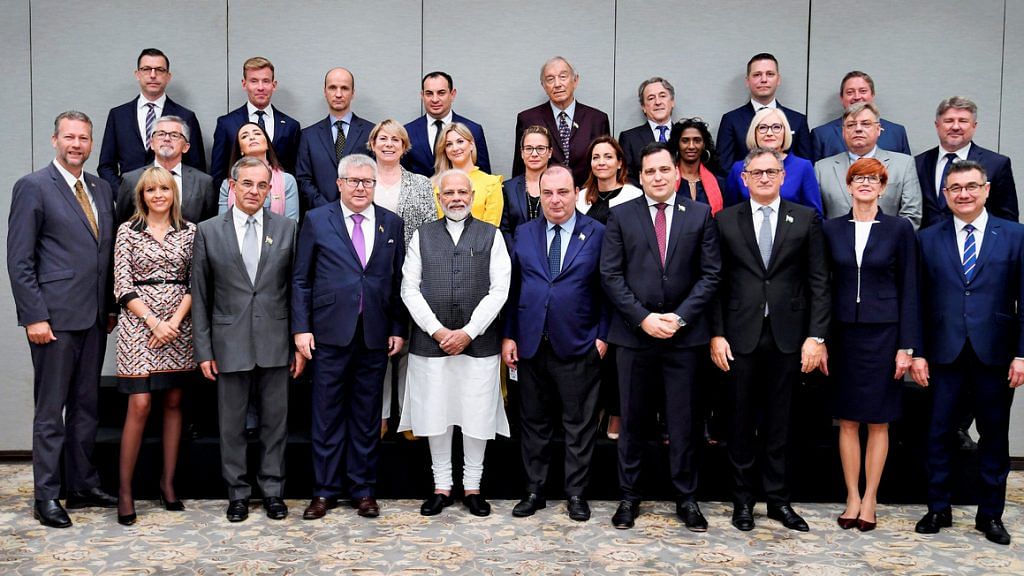New Delhi/Srinagar: The Narendra Modi government is signalling a shift of sorts by allowing 28 members of the European Parliament (MEP) to travel to Jammu & Kashmir Tuesday. But it now transpires that several of the visiting MEPs are from Right-wing and extreme Right-wing parties in Italy, Germany and France.
Lega Nord of Italy, Rassemblement National of France and Alternative For Germany (Deutsche, or AfD) have one thing in common: They are seen to be anti-immigration, anti-Islam and anti-Euro.
Alice Wiedel, a leader of Germany’s AfD, in the run up to the 2017 polls, said the arrival of more than a million refugees had made the country “a safe haven for criminals and terrorists”, and that those who attacked homosexuals were “always the same”, that is, “people with Muslim backgrounds, Arabs”.
Lega Nord, or simply Lega, which was led until September by Italy’s former deputy prime minister and interior minister Matteo Salvini, at a 2018 conference in Vienna on security and migration, likened African immigrants to slaves — evoking a rebuke from the Luxembourg foreign minister who was present.
Rassemblement National (National Rally)’s leader Marine Le Pen, who in 2018 tried to rebrand her party by changing its name (it was earlier Front National) and moving towards a more populist and anti-immigrant position and away from its anti-Semitic and racist overtones, is said to be a friend of Salvini.
A local NGO, WESTT, is said to be the Indian host of the European parliamentarians. Other MEPs from Britain and Poland are also part of the delegation.
Also read: How, on this day 72 years ago, Jammu & Kashmir agreed to become a part of India
‘Private visit’
The Ministry of External Affairs seems to have washed its hands of the European Union delegation. Sources said the MEA had “nothing to do with them”, that this was a “private visit”.
Significantly, European Union diplomats in Delhi said the same thing. “They are in Delhi in their personal capacity,” an EU diplomat who spoke on the condition of anonymity, told ThePrint.
Except that the meeting of the European parliamentarians with Prime Minister Modi and National Security Advisor Ajit Doval was not so private.
An official statement from the Prime Minister’s Office said: “PM Modi expressed the hope that (the MEPs) have a fruitful visit to various parts of the country, including Jammu & Kashmir. Their visit to Jammu & Kashmir should give the delegation a better understanding of the cultural and religious diversity of the region of Jammu, Kashmir and Ladakh; apart from giving them a clear view of the development and governance priorities of the region.”
Official sources also said that the European parliamentarians separately met NSA Doval for more than half-an-hour, and he briefed them on a “number of facts” which countered the “false propaganda by Pakistan”.
Doval said there are no longer any restrictions on movement, that there is 100 per cent landline and mobile telephony in J&K, that all hospitals are functional, and that although terrorists were trying to disrupt a return to normalcy by targeting innocent civilians, the government was ensuring the normal functioning of the economy.
The NSA’s briefing was also historical in nature: How Pakistan had never objected to the inclusion of J&K as a state of the Indian Union, how Article 370 was always “temporary” and the only such one out of 395 articles in the Constitution, how J&K had signed the Instrument of Accession into India in 1947.
Itinerary in Kashmir
The MEPs will travel to Srinagar Tuesday and spend the night in the city. They are likely to visit the Dal Lake and attend a presentation by civilian and police administration about the present situation and the working of the state.
According to sources, the delegation is also likely to have a lunch session with Indian Army officials at Badami Bagh Cantonment.
Police sources also said that the MEPs had put in a request to visit the militant-affected Shopian district in south Kashmir, but the state administration recommended they visit Anantnag instead. Though Anantnag too is an area affected by militancy, the district has a high concentration of security forces. This plan has not been finalised.
The delegation is also likely to meet a select group of civil society members — in Anantnag if the MEPs end up going there, or in Srinagar. The MEPs are then likely to hold a press conference or an interaction with select journalists, which is set to be held at a heavily-guarded Army facility in Srinagar.
Significance of the visit
The MEP visit to Srinagar is clearly aimed at countering Pakistan’s attempt to internationalise Kashmir. Pakistan PM Imran Khan, with considerable help from the Chinese, has succeeded in bringing it into the UN Security Council, although India managed to restrict it to closed-door discussions.
Only a week ago, Islamabad took Pakistan-based diplomats and media to the Line of Control and told them that India’s claims regarding terrorists being pushed into Jammu & Kashmir was not true.
Also read: Liberal democracy is under threat from digitisation as govts, tech firms gain more power
(With inputs from Snehesh Alex Philip)
